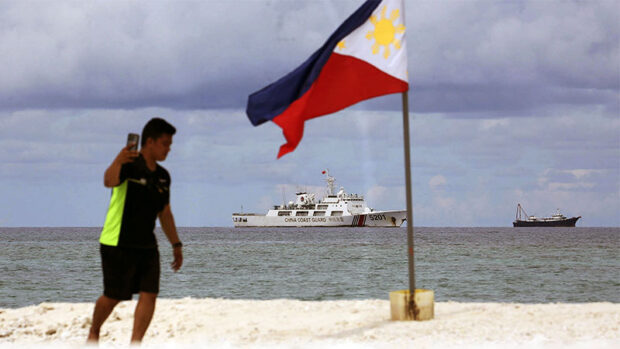
PH TERRITORY | A Philippine Navy sailor displays the country’s flag on Sandy Cay, a sandbar just 7.4 kilometers (4 nautical miles) from Pag-asa Island in the West Philippine Sea, in this June 2022 photo. Chinese naval ships have been patrolling the area. (File photo by MARIANNE BERMUDEZ / Philippine Daily Inquirer)
MANILA, Philippines — The growing support among administration senators for the government to raise before the United Nations General Assembly (UNGA) China’s many violations of the historic 2016 arbitral ruling would bolster the Philippines’ efforts to protect its territorial integrity, Sen. Risa Hontiveros said on Monday.
“This is very important if somehow we take it all the way to the UNGA adopting the resolution,” Hontiveros told reporters at the Kapihan sa Senado forum. “It may not be legally binding with China, but its political weight is heavy since it will show the sense (of the Senate) and the will of the international community.”
She thanked Senate President Juan Miguel Zubiri for expressing his support for the resolution she filed on June 19 which called on the Department of Foreign Affairs to elevate to the UN’s primary policymaking body Beijing’s belligerent actions in the West Philippine Sea (WPS).
On Sunday, Zubiri said the Senate would immediately take up Hontiveros’ resolution at the resumption of its regular session on July 25.
He added that the majority of senators, including Senators Francis Tolentino, JV Ejercito and Jinggoy Estrada, also backed the move to compel China to respect the Permanent Court of Arbitration’s ruling that voided its sweeping claims over nearly the entire South China Sea.
“I will campaign, lobby and do the groundwork to secure the support of our colleagues in the majority (bloc),” said Hontiveros who had based her resolution on the suggestion of retired Supreme Court Senior Associate Justice Antonio Carpio, the leading voice in the country’s fight for sovereignty over the waters within its 370-kilometer exclusive economic zone (EEZ).
Deafening silence
The opposition senator, however, assailed Malacañang’s “deafening silence” during the seventh anniversary of the arbitral court’s July 12, 2016, decision.
While acknowledging President Marcos’ policy to pivot away from China and improve the Philippines’ military ties with the United States and other allies, Hontiveros observed that he seemed to be “pulling some of his punches” and has yet to admonish Beijing for repeatedly harassing Philippine vessels within the country’s EEZ.
“Even if this pivot toward the larger international community is for real, we have yet to hear the President directly condemning China’s repeated disrespect of our sovereignty,” she said.
Support from House
A direct and categorical statement from Mr. Marcos defending the arbitral ruling would provide “political and executive support” for the state forces manning the country’s territorial waters, Hontiveros stressed.
At the House of Representatives, Assistant Minority Leader and Gabriela Women’s party list Rep. Arlene Brosas also expressed her support for the Senate resolution, saying that every avenue should be explored to hold China accountable for its actions.
“We fully support the call to bring the issue to the UN and provide evidence of China’s incursions and violations of the Hague Arbitral ruling. It is crucial that the international community is made aware of China’s continuous reclamation of territory within our [EEZ] and its impact on the freedom of navigation in the region,” she said in a statement.
Like Hontiveros, she also urged the President to condemn China’s military aggression. But at the same time, Brosas said the United States should likewise be held accountable for “its aggressive military expansion in key areas in the Philippines, which are strategically located near the West Philippine Sea.”